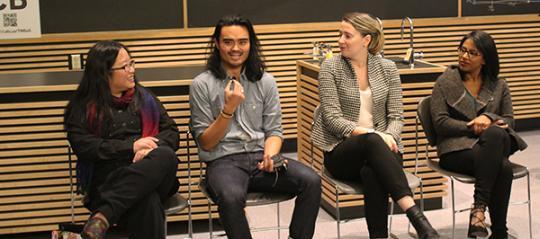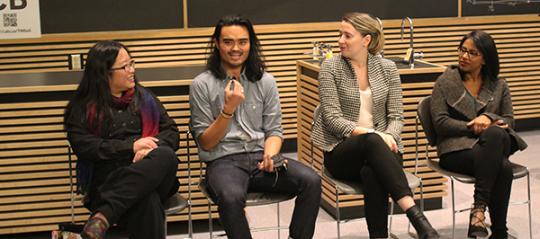
A panel of alumni visited the CMNS 110 class recently to share their insights and advice. Ranging from a variety of industries – health, government, public relations, broadcasting, tech and education, the guest speakers included:
- Sarah Allin, Manager, Communications and Marketing, Western Canada & Territories Region, Service Canada, Government of Canada, BA Communication 2012
- Rena Heer, Senior Account Manager, Edelman and former Anchor/Reporter with CTV, BA Communication 2001
- Shem Navalta, Content Marketing Specialist, SAP, BA Communication 2016
- Gladys We, Director, Communications and Marketing, SFU Faculty of Arts & Social Sciences, BA Communication 1991, MA Communication 1997
- Angela Wilson, Communications Manager, Provincial Health Services Authority (PHSA), BA Communication 2002

Here are a few of the main tips shared during the presentation:
Build Your Network
Angela Wilson advised students, “Make sure you get relevant experience; you need to show what you can do as university grades don't matter in the professional world. If you don't have experience, then volunteer to get it. Join a communications professional association (IABC or CPRS).” Look at networking as opportunity to show professionals that you have an interest in learning from them. By volunteering with others who are established in your field, you are able to build meaningful connections. To reiterate her point, she mentioned that in her field of health care communications, they rarely have junior roles, so they are usually looking for experienced professionals. As many sectors consider experience to be crucial, find opportunities to gain experience using your network to help you on your career path.
Explore Your Options
Shem Navalta is a strong advocator of exploring your options. During his Co-op work terms, he learnt to keep an open mind with his search through working in the oil and gas industry and with a non-profit organization as a way to try out different fields. During his time at school, he transitioned from pursuing a career in journalism to exploring his interest in graphic design by taking some IAT classes and eventually using these skills in a communication role at the large global tech company, SAP.
Exploring your options and trying out different fields of work help to make you a more well-rounded person in terms of skills and competencies. When you do figure out your career direction, you will bring all that you’ve learned through your exploration and to apply to your desired career field.
Skills and Competencies You Will Need
The alumni concluded that regardless of what field you plan on working in, your communication skills are imperative. But what exactly does it mean to have strong communication skills? Sarah Allin discussed the importance of strategic thinking, especially in her work in government. It is critical to be able to write or articulate concisely in order to make technical or program-related details easier to understand. In almost any industry, in some shape or form, you will be responsible for taking what someone has to say and simplifying it, figuring out how to best get the message out to the target audience. Being brief is an important skill to have because you will only have so much time to get your point across to your audience.
Another important aspect to communication is your ability to listen. What does it really mean to listen, especially in a work place setting? It takes a degree of humility to be able to take the feedback you get and use it to build upon what you’ve already done. Strive to constantly be learning, actually taking feedback and using it to improve your work.
Even though your path will not be the same as our alumni who spoke at the panel, the advice they gave is still applicable for everyone.
Each of the alumni shared how unique their career path was. Through following your passions, keeping an open mind, connecting with people and honing your communication skills, you will create your own unique path too.
Beyond the Blog
- To learn more about Co-op opportunities, visit the Co-op homepage.















